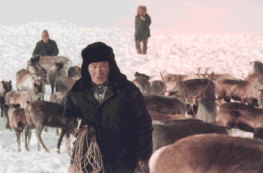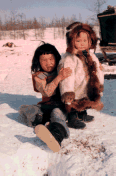

|
Aboriginal hunters from Russia and Canada share language of the caribou |

|
For biologists, caribou migration is a big mystery. For all of their scientific method, technical sophistication, and statistical analyses, they can't figure out why the animal chooses one route over another on its 3,000-mile annual trek across the arctic.
But for the indigenous people of the circumpolar north, nothing makes more sense than where caribou will show up next. Sharing the land for several thousand years has produced a mutual understanding and respect between man and beast that virtually constitutes a language, says Dr. David Anderson.
And Anderson should know. The U of A anthropology professor spent a year and a half living with the Evenki people of northern Siberia while working on his doctorate in 1992 and 93. He lived almost exclusively on raw and boiled caribou meat, and traveled about 10 kilometres each day on the hunt.

|
"It was very nice, very restful, better than being a professor.and no health problems, in fact I was healthier there than here, never caught colds or anything."
Having just received a three-year SSHRCC grant to take a closer at caribou culture in the circumpolar north, Anderson will return to the field next fall, this time organizing an exchange between the Evenki and the Gwich'in people of northern Canada. He says the two peoples have long been aware of each other's existence, but until recently, Cold War policies have prevented any kind of meaningful interaction.
"Either population knows more about reindeer (a term used interchangeably with caribou) than I do, so they're the specialists and I'm sort of the person who's translating," says Anderson.
The two groups stand to gain a great deal from the exchange, says Anderson, since they both live in harmony with caribou but have different hunting practices. The Gwich'in, for example, used to use dogs, but have now given in to the modern convenience of trucks. The Evenki, on the other hand, use herds of tamed caribou to help locate their wild cousins.
"I think poetically that's the most beautiful thing about it [the Evenki hunting method]. It means they understand the biology in a very intimate way," says Anderson.

|
He says the Evenki see caribou as "persons" who have an investment in living with humans. Even the wild deer don't consider the hunters a threat, he says, because they are all in an "alliance of survival." The hunters must obviously kill some of the animals to eat, but they also help the species to thrive by, for example, clearing land for pastures.
"Indigenous people who have been surviving off these beasts always know where to find them. They'll say, 'Oh yeah, they're coming right here, and they'll be here in two weeks.' Sure enough, they appear."
"The point is, the two of them have worked out a relationship that has been successful for about 3,000 years, and it's not because the Evenki have had access to airplanes to count the caribou and do statistical calculations. They are able to control these animals by understanding what the animal is going to do; they kind of know their psychology."
Anderson says simply watching how a deer stands can reveal what it intends to do next. "The deer itself is telling you everything you need to know. We just need a model subtle enough to realize it."
During his stay with the Evenki, Anderson says he would get up very early to start the fire, wash his face, and head outside with the rest of the hunting "brigade" to speculate on where the domestic herd had wandered overnight. They would test the wind, observe the landscape, and ingest about five cups of strong tea and bannock, before putting on skis to go in various directions searching for the herd. Once rounded up, some of the herd would be harnessed to sleds and mobile homes, and the hunt for the wild herd would continue.
Anderson is fluent in Russian but knows only a little Evenki, not a huge problem, he says, since "they generally don't talk a lot anyway." The people have a more intuitive way of relating, largely through observation, which may partly account for their deep understanding of the reindeer, he says.
Besides sharing their respective bodies of knowledge about caribou behavior, which is Anderson's main interest, the Evenki and Gwich'in, hopefully, will also walk away from the exchange with useful information on self-government and land management. Anderson says he would like the Evenki to witness Canadian aboriginal participation in political decisions that affect the native way of life, a process sorely lacking in Russia. Biologists in the Canadian north, for example, are no longer allowed to use "intrusive monitoring" techniques that disturb the delicate relationship between native people and caribou. With any luck, says Anderson, the Evenki will return home better able to make the Russian government listen to their concerns.
"It's unique in the sense that it's one of the first circumpolar research projects since the turn of the century, because the Cold War shut all of this down," says Anderson. "And it actually involves indigenous people as equal participants in research."
![[Folio]](http://www.ualberta.ca/~publicas/folio/gif/small/folio.gif)
Folio front page |
![[Office of Public Affairs]](http://www.ualberta.ca/~publicas/gif/small/opahome.gif)
Office of Public Affairs |
![[University of Alberta]](http://www.ualberta.ca/~publicas/gif/small/uahome.gif)
University of Alberta |